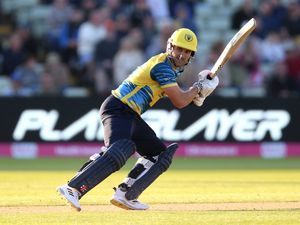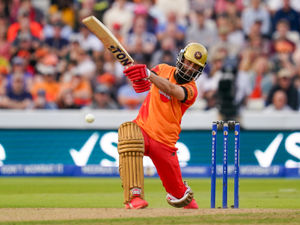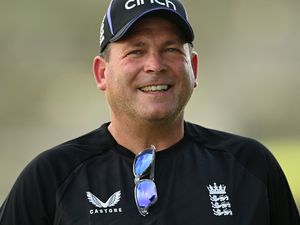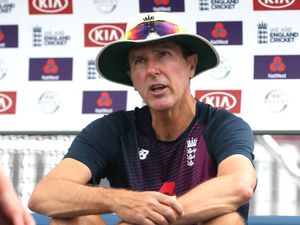Sir Geoffrey Boycott: Reach a century? You’d put money on me if I was batting!
Sir Geoffrey Boycott lets out a chuckle while weighing up his chances of making another century.
“81 not out. Amazing!” exclaims the English cricket legend. “If I were batting, you’d put your money on me getting to 100, wouldn’t you?
“But you can’t be so confident getting to 100 in age, can you? That’s a bit more difficult, I’d say a lot more difficult! There aren’t too many who get a telegram from the Queen, are there?”
There is a pause, before he adds: “But I don’t want to live to 100 unless I’ve still got my faculties.
“I might struggle to walk or jump or run like I used to but you want to be able to talk and converse with people, or talk sensibly. If not, I hope I go in my sleep earlier.”
Those last couple of sentences are typical of the frank, forthright, leave-nothing-to-doubt comments which helped Boycott make a cricketing giant, first as a player and then, for more than 30 years, as a broadcaster on television and radio.
On the evidence of this phone call, conducted yesterday by coincidence on his 81st birthday is anything to go by, he has thus far lost none of his sharpness. For 40 minutes, Boycott talks passionately and thoughtfully about the sport he loves and a few other things besides.
Next Friday, he will be offering his opinions in public at Lichfield’s Garrick Theatre. An Evening With Sir Geoffrey Boycott will primarily, he hopes, provide “some fun” after a period when there hasn’t been a huge amount of it about.
Even now, the pandemic continues to have an impact. At least a couple of planned shows on his tour have been postponed due to poor ticketing sales and Boycott has sympathy there, having recently experienced the effects of Covid-19 first hand when both he and wife Rachael tested positive early last month.
“We’re both double-vaccinated and I’ve even had a booster but we still got it,” he says.
“I know quite a few events are struggling because people are still wary and they should be wary. I think people should still be wearing masks.
“It is ridiculous. Everywhere you go, 90 per cent of people have no mask, as though they think everything is alright. If they realised what it can do, they would be fighting to get the vaccination.
“It is tough at the moment and we have had to postpone one or two shows. But we will have some fun, that is the main thing.”
There is certainly no shortage of things to discuss from a cricketing point of view. England begin their defence of the Twenty20 World Cup tomorrow when they face the West Indies in the United Arab Emirates, while The Ashes also loom large, now less than two months away.
Boycott’s personality is so large it has inevitably – and unfairly – led to him being caricatured. No question, he is a straight-talker but friendly with it and any misconception he might represent a bygone age evaporates when you listen to his progressive, sometimes radical views on the future of his sport.
On the subject of four-day Tests, Boycott might even be termed a revolutionary.
His approach is succinctly summed up when he remarks: “I like good cricket. I don’t like bad cricket.” Rather than fear change, Boycott is keen for the sport to embrace it.
“Cricket has always mirrored the times we live in, right from its inception,” he explains. “Back then, when you think about it, there was no TV or radio and if people went and spent the day watching Test cricket it was one of the few bits of entertainment they had.
“We live in an age when people not only want everything now but expect it. Life is about the instant and T20 fills that perfectly. It is three hours long and all excitement, playing to full houses, how can you knock it?”
Boycott eagerly points out his first ever cricket match, at the age of 10, was 20 overs-a-side when arguing the shorter format is not a 21st century invention.
The difference now is in its marketing and his chief frustration, one might call it fear when contemplating the future of the sport, is the inability of cricket’s administrators to apply the same standards to the red-ball game.
“I feel sad and disappointed in the administration of the game,” he says. “They do not market Test cricket in the same way they do T20.
“All the eggs are going in the T20 basket when the two should be able to co-exist. They both serve different needs and audiences.”
Boycott shares the view that pushing the county championship to the fringes of the season, with the bulk of matches being played in April, May and in the case of this year September, has had the inevitable knock-on effect of reducing the quality of the England Test team.
He adds: “If the administrators are concentrating more on T20 and selling that, then players are going to do the same.
“If you get sold in the IPL auction, you can make a fortune. The more is focused on T20, the standard of Test cricket is going to suffer. What else do you expect? The counties should be playing cricket every week through the summer.”
One way to help preserve the future of the longer format, Boycott believes, is to speed it up.
Calls for the introduction of four-day Tests, of which he is in favour, are considered controversial by many. But as Boycott points out, so too are the slow over rates which have consistently led to paying spectators being short-changed.
“It’s not so much the days, as the overs bowled,” he says. “Around 90 per cent of Test matches finish in 350 overs and even then, draws aren’t a bad thing. Some of the best games I ever played in were draws.
“We’ve got a situation now where the administrators have allowed the over rates to go down, from 20 an hour to the point where they can’t even bowl 15. They give teams an extra half-hour and half the time they still can’t get the 90 for the day in. The key is to say: ‘Right, you are going to bowl 16 overs an hour if you like it or not and if you don’t you are going to get penalised 10 runs an over’.
“So If you bowl for a day and you are six overs short you give the opposition 60 runs. You have to make the penalty so severe it hurts them in that game. Fining them doesn’t mean a thing, the players earn so much money now.
“The administrators aren’t strong enough to do something about it. People pay a lot of money to attend Test cricket and at the moment they are defrauding the public.”
He continues: “Why has T20 succeeded? Because it moves fast. We are not looking to change the ethos of the game but the more balls the batsman gets, the more runs he will score.
“The more balls the bowler bowls, the more chance he has of getting wickets. We don’t need to change anything else in Test cricket, just move it forward.”
An Evening with Sir Geoffrey Boycott: A Brand New Knight Out takes place next Friday, October 29 at Lichfield’s Garrick Theatre. For tickets visit lichfieldgarrick.com





